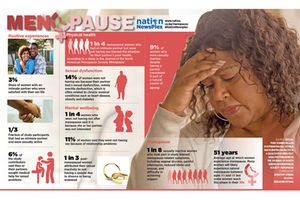When menopause knocks on your door early

Stress resulting from social problems may cause some women to experience symptoms similar to those of early menopause.
What you need to know:
- Premature menopause happens because the ovaries stop producing eggs many years before they normally would.
- This may be due to chemotherapy or radiotherapy to treat cancer; genetic disorders; infections that affect the ovaries such as mumps; surgery to remove the ovaries or uterus; family history of early menopause; smoking; other diseases such as HIV, thyroid disease, Crohn’s disease, rheumatoid arthritis, chronic fatigue syndrome, among others.
Hello Doc, I am Betsy, a 30-year-old woman with no children. My menses have reduced for the last five months from four to two days. Is this a red flag for early menopause? I am so worried because I am planning to have a child. What's your opinion?
Dear Betsy,
The average age when menopause starts is 51 years (45 to 55 years), though quite a number of women can experience it while in their forties, while some experience it much later. Menopause is diagnosed when you miss your periods for one year. There may be irregularity of the periods for several months or years before they disappear for 12 months or more. During this period, getting pregnant is still a possibility. In addition to irregular and/or absent periods, other symptoms of menopause include hot flashes, night sweats, chills, irritability, mood changes, vaginal dryness, sagging breasts, problems with sleep, weight gain, thinning skin and hair.
It is rare for women below 40 years of age to go through menopause, but it can happen. This is called premature menopause. The symptoms are the same as “normal” menopause and the use of hormonal contraceptives may make it difficult to identify the menstrual changes.
Premature menopause happens because the ovaries stop producing eggs many years before they normally would. This may be due to chemotherapy or radiotherapy to treat cancer; genetic disorders; infections that affect the ovaries such as mumps; surgery to remove the ovaries or uterus; family history of early menopause; smoking; other diseases such as HIV, thyroid disease, Crohn’s disease, rheumatoid arthritis, chronic fatigue syndrome, among others. For many women with premature menopause, though, the underlying cause is not identified.
There are other possible reasons for the changes in your menstrual cycle. It may be due to hormonal imbalance or problems with functioning of the ovaries. It may also be as a result of use of hormonal contraceptives, excessive stress, significant change in body weight (either adding or losing a lot of weight) and excessive exercise. Sometimes menstrual changes could be due to problems within the uterus like uterine polyps, fibroids, or severe scar tissue formation within the uterus, or because of other diseases like thyroid disease. The menstrual changes may not affect your ability to get pregnant, depending on what the underlying cause is.
It is advisable for you to visit a gynaecologist for examination and tests to determine the exact cause of the menstrual changes. The treatment will depend on the underlying problem identified.
What would be the cause of swollen gums which ooze white pus in children?
Dear reader,
Swollen gums that ooze pus most likely indicate gum infection with development of a gum abscess. An abscess is a collection of pus that develops as the body fights infection.
This usually starts with inadequate cleaning of the teeth or having a bit of food stuck near the gum. Bacteria then builds up, leading to inflammation of the gum. It can also begin from a tooth with a cavity, and the bacteria within the cavity spread to the gum.
The infected gums will be painful, swollen, discoloured and may bleed easily. The affected teeth may be sensitive or there may be toothache. There may also be facial swelling, swelling of the lymphatic glands on the neck or jaw, fever and pain when chewing.
This requires urgent review by a dentist. After examination, the pus will be drained and the underlying causes will be addressed, for instance treatment of a tooth cavity. Medication for pain and antibiotics will also be prescribed. Gum infection requires immediate medical attention because it does not clear on its own, and it can spread to the rest of the mouth and to other organs in the body. Gum infection can be prevented by practising good oral hygiene through proper brushing twice a day, flossing regularly and limiting snacks and sugary foods/drinks. In addition, children should have dental check-up at least twice a year and early dental review whenever dental problems arise.
Dear Doctor,
What are the symptoms of hormonal acne and how can one treat it?
Dear reader,
Acne is an inflammatory skin disorder, where the skin pores/hair follicles are blocked by sebum and dead cells, leading to an outbreak of pimples. The pimples develop due to hormonal changes (increased testosterone levels), infection and the amount of natural oily substance (sebum) produced by your skin. When the pores are blocked, this prevents the shedding of the dead cells and keeps the sebum from reaching the skin surface, which in turn allows bacterial multiplication, which then leads to inflammation. The skin may become swollen, red, and painful. The inflammation then leads to development of pimples, which may be whiteheads (white bumps), blackheads, papules (painful reddish pimples), pustules (pimples that have white or yellow pus), nodules (large painful solid swellings) or cystic acne, where there are deep lesions, sometimes with scars.
It is best to manage acne together with the dermatologist/skin specialist.
There are medications to manage the inflammation and infection, and promote healing. The right combination of medications for an individual may take a while to identify, so be patient.
Home care includes gentle cleaning of the face twice a day; in the morning, and in the evening before bed and taking a shower after activities that make you sweat a lot. When cleaning, use a mild soap and a gentle towel. Do not scrub your face too much while cleaning it since it is already sensitive.
Other helpful measures include taking a lot of water, taking a healthy diet rich in fruits and vegetables and participating in exercise. Protect your skin from the sun using sunscreen and hats, and avoid skin products that are harsh to your skin. Do not press the pimples as this leads to developing black marks on the skin.
Send your questions to [email protected]




